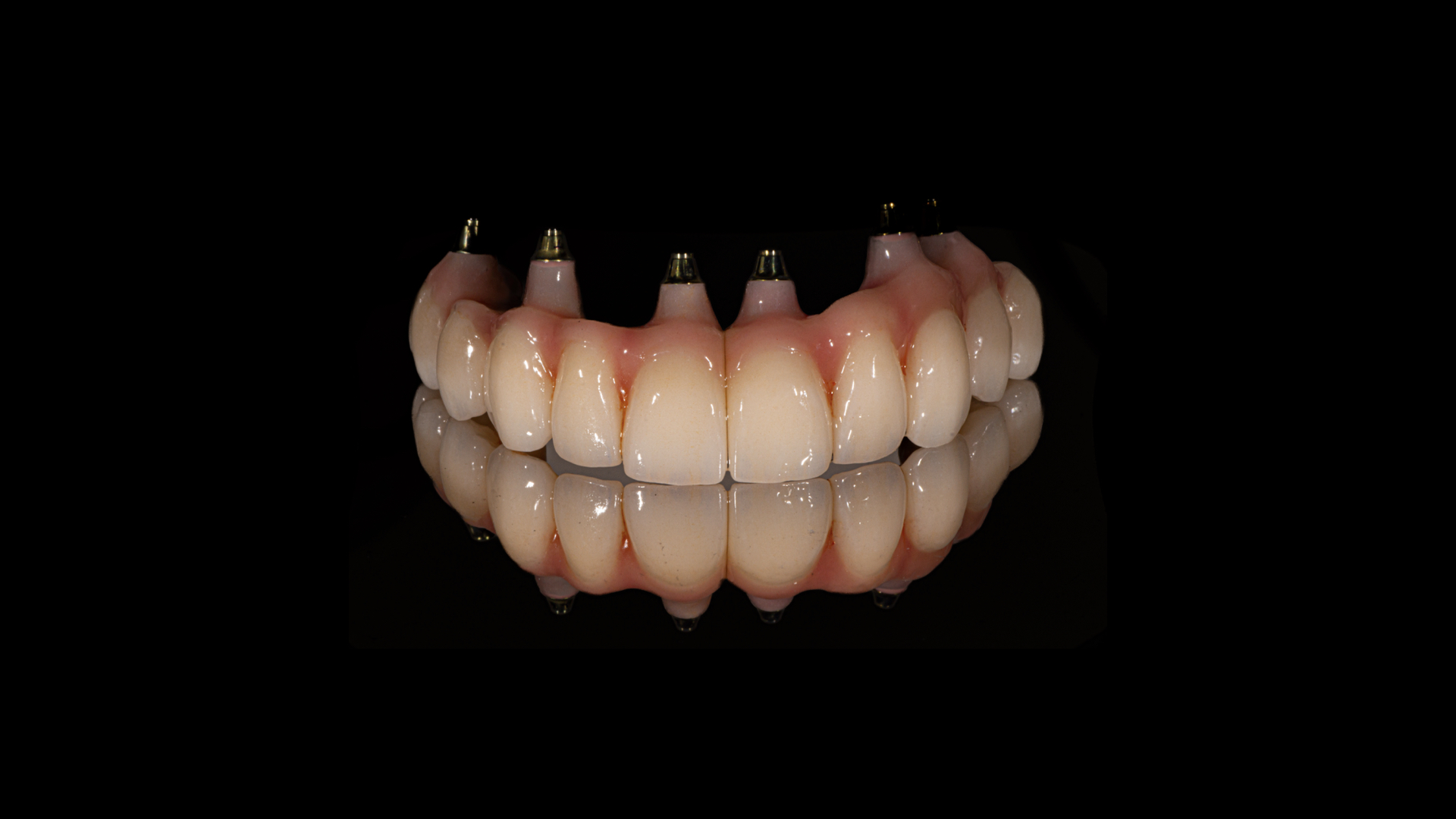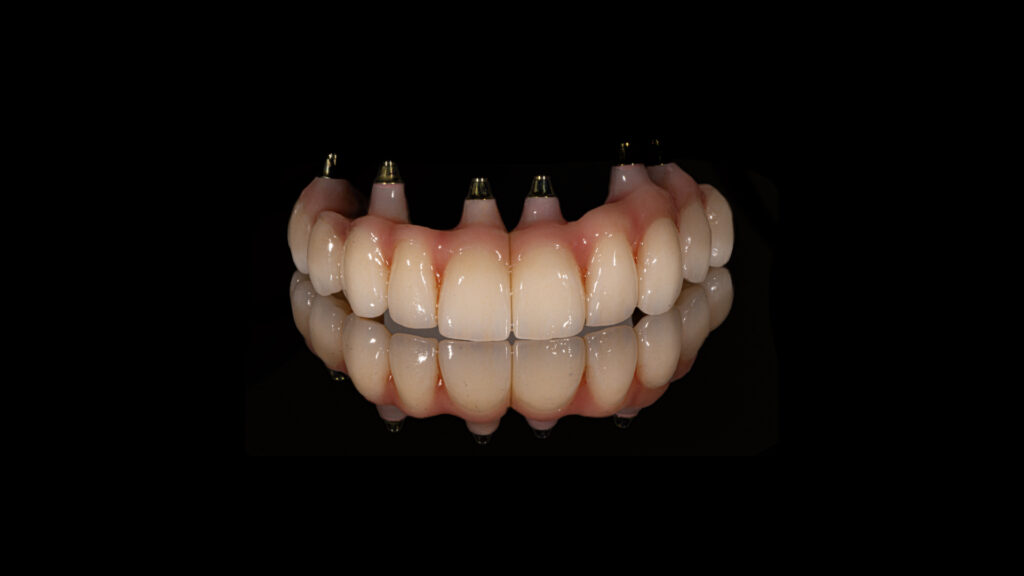
Losing all your teeth can create serious challenges in daily life – from difficulty chewing food to reduced confidence in social interactions. Full mouth dental implants offer a permanent, advanced solution that completely resolves these issues. This treatment uses several implant posts in the jaw to support a complete set of fixed, natural-looking artificial teeth that replace missing teeth.
The benefits of full mouth implants compared to removable dentures are remarkable. Not only do they create a completely natural appearance, but they also fully restore chewing function and prevent jawbone deterioration. Unlike dentures that may slip, full mouth implants provide complete stability and feel just like natural teeth.
If you’re facing the challenges of complete tooth loss, full-arch dental implants could transform your life. In this article, we’ll thoroughly explore this treatment – the procedure steps, ideal candidacy requirements, and post-treatment care guidelines. Join us to learn more about this advanced dental technique and discover how you can regain a natural smile and full functionality.
What Are Full-Mouth Dental Implants and How Do They Work?
Full-mouth dental implants provide a permanent, advanced solution for replacing all missing teeth in one or both jaws. This treatment typically involves placing 4 to 6 titanium implants in each jaw that serve as anchors for fixed or removable dentures. When considering full-arch dental implants, it’s essential to understand that they fuse securely with your jawbone through osseointegration, creating a stable foundation for artificial teeth. Unlike traditional removable dentures, this system is completely fixed and functions just like natural teeth.
At D’Amico Dental Care in Watertown and Wayland, our full mouth implant process is designed for your comfort and success:
- Your Personalized Plan
We start with detailed 3D scans and bone assessments to create a treatment roadmap just for you. - Gentle Implant Placement
Our skilled surgeons place your dental implants using precise, minimally invasive techniques. - Natural Healing Time
Over 3-6 months, your implants gradually fuse with your jawbone (this is called osseointegration) to create a rock-solid foundation. - Your New Smile Reveal
We’ll attach beautiful, permanent crowns that look and function just like natural teeth.
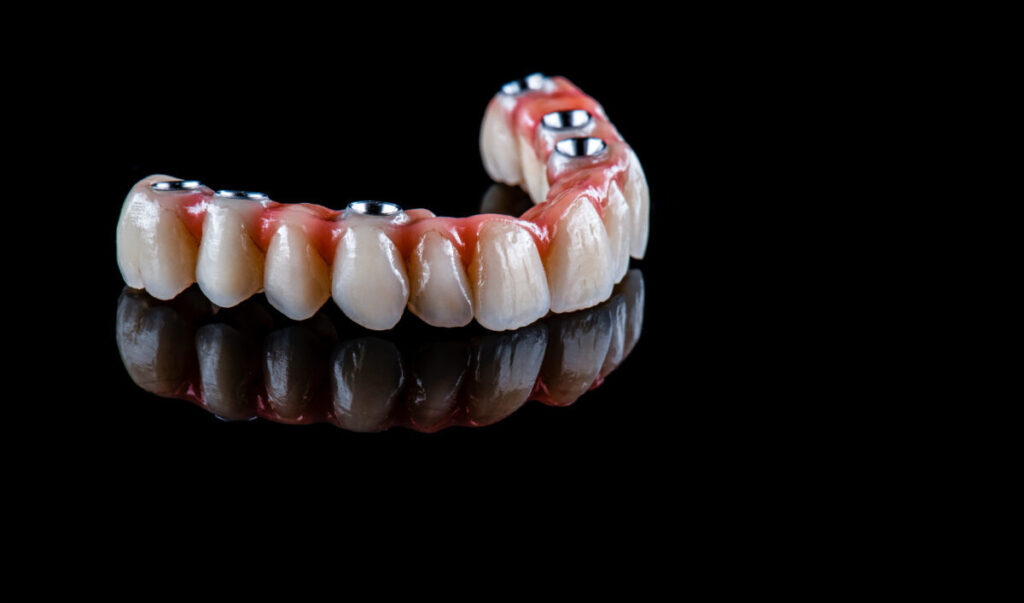
Benefits of Choosing Full-Mouth Dental Implants
Full jaw implants offer significant advantages over traditional tooth replacement methods. The most important benefit is restoring nearly full chewing function (up to 90% of natural ability), allowing patients to enjoy all types of food again. Aesthetically, full mouth dental implants create a completely natural-looking smile that appears just like real teeth. The implants also prevent jawbone deterioration and maintain facial structure, unlike removable dentures that gradually change facial shape over time.
Other key advantages include:
- Complete stability (no slipping when talking or eating)
- Long-term durability (20-30 years with proper care)
- Greater comfort compared to removable dentures
- Improved gum health
- Prevention of digestive issues from insufficient chewing
Unlike traditional bridges, full mouth implants don’t require altering adjacent teeth, preserving your healthy natural tooth structure.
Full Mouth Dental Implants vs Dentures: Which Is Right for You?
Full-arch dental implants and dentures both replace missing teeth, but they have fundamental differences. Implants integrate with your jawbone to create a permanent, stable foundation that looks natural and functions like real teeth. This approach prevents bone loss and eliminates the need for dental adhesives. Dentures, while more affordable initially, can cause discomfort, speech difficulties, food restrictions, and require periodic adjustments.
Key factors when choosing between them:
- Budget: Implants cost more upfront but are more cost-effective long-term
- Jawbone health: Implants require sufficient bone density
- Function expectations: Implants provide better chewing ability
- Age considerations: Dentures may suit seniors better
- Treatment time: Implants take longer (3-6 months)
For patients seeking a permanent, comfortable, and high-performance solution, full mouth dental implants offer superior results. However, dentures may be better for those with budget constraints or who aren’t good surgery candidates. Consulting an implant specialist can help you decide.
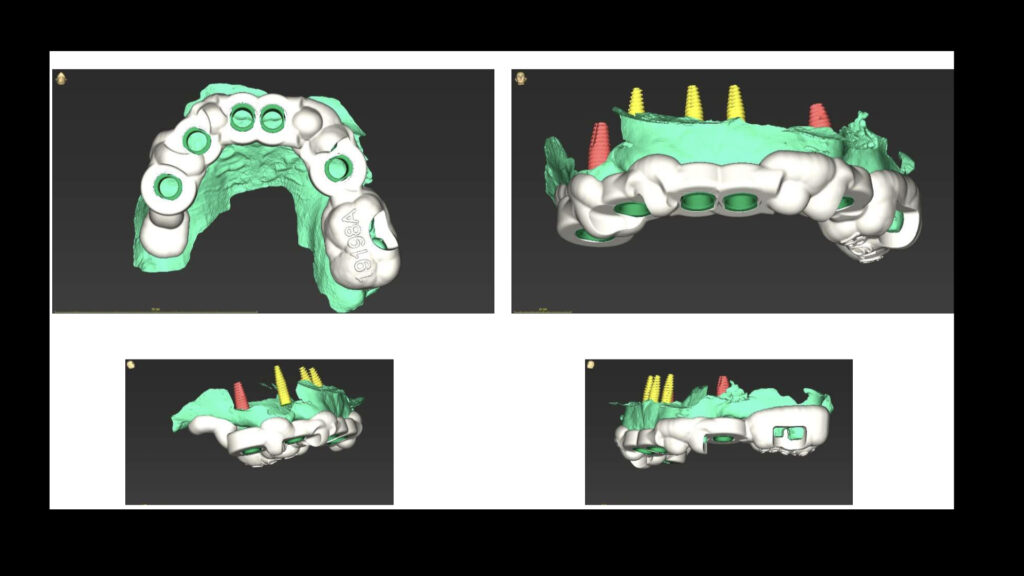
Full Mouth Dental Implant Procedure
A full jaw implant procedure is an advanced, multi-stage process that begins with a comprehensive consultation. At D’Amico Dental Care in Watertown and Wayland, during this initial phase, our dentist conducts thorough examinations and uses 3D imaging (CBCT) to evaluate your jawbone quality and density. Based on your specific needs, they’ll create a personalized treatment plan that determines the exact number of implants needed (typically 4-6 per jaw) and their ideal placement positions.
The surgical phase, performed under local anaesthesia or general sedation, involves placing titanium implants into your jawbone. In cases with insufficient bone, a bone graft might be necessary. After surgery, a 3-6 month healing period allows for complete osseointegration (fusion between implants and bone).
When considering full mouth dental implants, it’s important to understand that the final phase begins after successful osseointegration. Your dentist takes precise impressions to craft permanent prosthetics (fixed or advanced removable) in a specialized lab. Made from high-quality, durable materials, these custom prosthetics attach securely to your implants, delivering natural-looking results that function like real teeth.
The entire process typically takes 4-8 months, but the results can last 20-30 years. Benefits include:
- Complete chewing function restoration
- Facial structure preservation
- Prevention of bone loss
- Significant quality of life improvement
Patients enjoy stable prosthetics that let them eat all foods confidently and smile naturally.
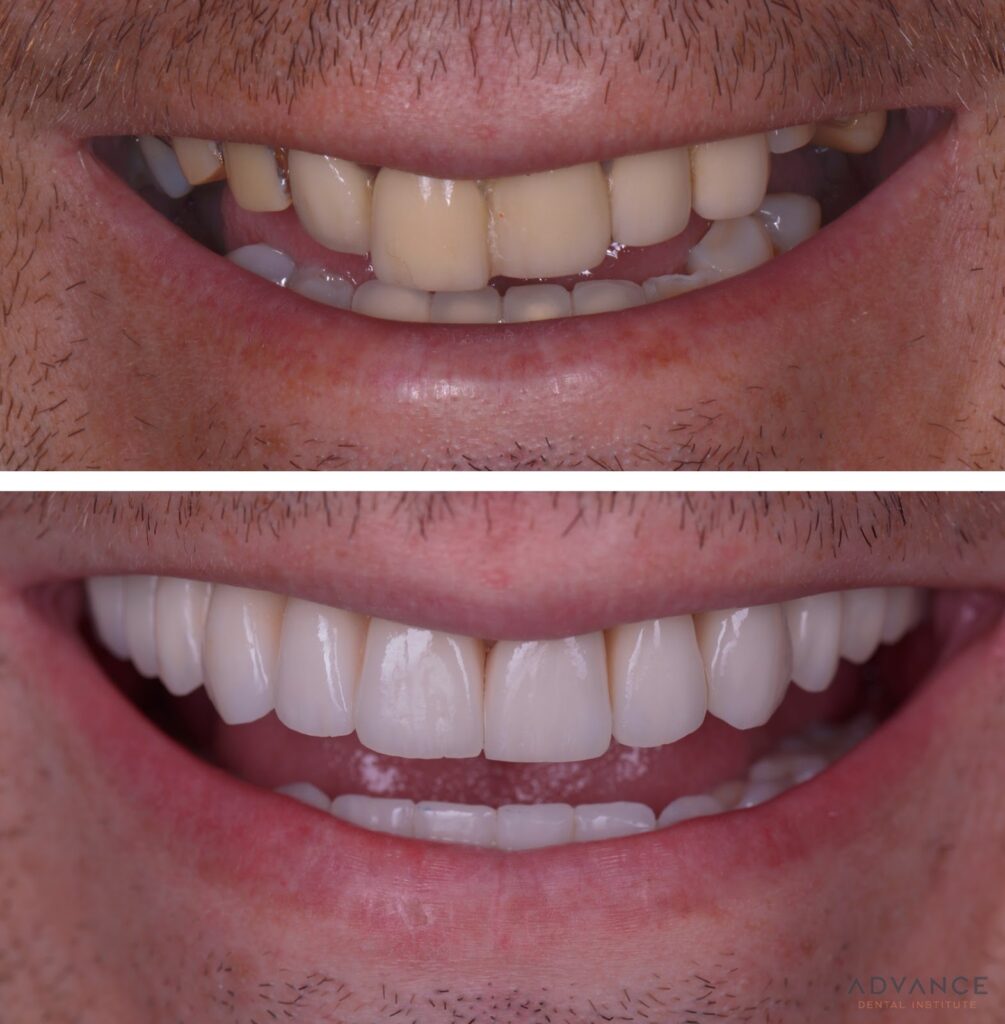
Are You a Candidate for Full Mouth Dental Implants?
To determine if you’re a good candidate for full mouth dental implants, your dentist will evaluate several key factors. Your overall health is especially important – uncontrolled systemic conditions like advanced diabetes or severe osteoporosis might interfere with implant healing. Jawbone density and volume are also crucial since implants need adequate bone support. If bone loss has occurred, you might need a bone graft first. Healthy gums free from active periodontal disease are another essential requirement.
Other important considerations include:
- Habits like smoking that may reduce implant success
- Your commitment to oral hygiene
- Having realistic expectations about results
- Financial readiness (as costs are higher than traditional options)
Even if some conditions aren’t ideal, modern solutions like bone grafts or All-on-4 techniques mean many patients can still qualify. An implant specialist can give you the most accurate assessment of your options.
Recovery and Aftercare Tips for Full Mouth Dental Implants
Initial Recovery (First Week):
Right after your surgery, carefully following your dentist’s instructions is crucial. For the first 24-48 hours, ice packs will help reduce swelling. Take your prescribed antibiotics and pain medications exactly as directed. Stick to soft, cool foods and avoid anything hot, hard, or sticky. Getting plenty of rest and avoiding strenuous activities is key during this time. Also, skip the straws and cigarettes – these can disturb the blood clot that’s forming.
Long-Term Care and Oral Hygiene:
Once you’re past the initial healing phase, oral hygiene becomes especially important. Brush gently with a soft toothbrush and use implant-specific floss daily. Don’t forget your six-month checkups to monitor your full mouth dental implants and gum health. Avoid chewing on hard items like ice or candy. If you grind your teeth at night, a night guard can protect your investment. Smoking could compromise your results, so quitting is highly recommended. With proper care, your implants can last for decades!
How Long Do Full-Mouth Dental Implants Last?
At D’Amico Dental Care in Watertown and Wayland, we want you to know that with proper care, full mouth dental implants can last 25 to 30 years – sometimes even a lifetime! The titanium implant posts have excellent biocompatibility, meaning they typically fuse completely with your jawbone and rarely need replacement. However, the dental crowns attached to them may require replacement after 10-15 years, depending on the materials used (ceramic, zirconia, or acrylic) and how much you use them.
Key factors affecting your implants’ longevity:
- Oral hygiene: Regular brushing and flossing
- Checkups: Professional cleanings every 6 months
- Lifestyle: Avoiding smoking and excessive alcohol
- Eating habits: Not chewing hard items like ice
- Overall health: Managing conditions like diabetes
While incredibly durable, some components like abutments or crowns might need occasional adjustments or replacements over the years, which are considered maintenance costs.
“ The present study concludes that good, long-term survival rates are associated with full mouth rehabilitation using dental implants. “ pubmed.ncbi.nlm.nih.gov
FAQ
1. How do full-arch dental implants transform your smile?
Full-arch dental implants create a naturally rejuvenated smile by custom-designing teeth to match your facial features. This method produces uniform gum lines and teeth with optimal color and shape that are virtually indistinguishable from natural teeth. By filling all gaps, it prevents facial collapse, typically associated with tooth loss.
2. How does chewing ability improve?
Full-arch dental implants restore up to 90% of natural chewing capacity. Unlike removable dentures, offering only 20-30% efficiency, this system lets you comfortably chew all food types. The implants’ strength and stability recreate the sensation of having natural teeth.
3. Why do implants prevent bone loss?
Implants stimulate the jawbone like natural tooth roots, preventing resorption. This unique benefit not only maintains facial structure but also prevents facial deformation and premature aging from long-term edentulism. After 10 years, full-arch implant patients retain up to 80% more bone than denture wearers.
4. How do they differ from removable dentures?
Unlike dentures that may slip or cause gum irritation, full-arch implants are permanently fixed with zero movement. This system eliminates messy denture adhesives while providing natural tooth-like comfort through complete osseointegration.
5. How does pronunciation improve?
Removable dentures often cause lisping or clicking sounds. Full-arch implants eliminate these issues with their absolute stability, enabling clear, natural speech without prosthetic movement concerns. Most patients report immediate pronunciation improvements post-installation.
6. Why do implants enhance confidence?
With fixed, natural-looking teeth, you’ll never worry about your teeth slipping in social situations. This freedom allows confident smiling, speaking, and social participation. Many patients report profound improvements in their social and professional quality of life.
7. How do you care for full-arch implants?
Unlike dentures requiring daily removal and cleaning, full-arch implants are maintained exactly like natural teeth with brushing and flossing. They eliminate special adhesives or cleaning solutions, though biannual dental checkups remain essential.
8. Why are implants a valuable investment?
Despite higher initial costs than conventional dentures, full-arch implants prove more cost-effective long-term. With 20-30 year lifespans (often lifetime with proper care), they eliminate recurring denture replacement costs. Their health and quality-of-life benefits make them truly transformative.

